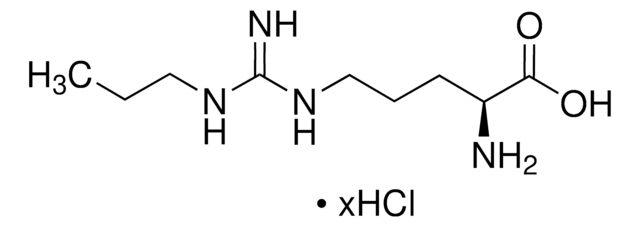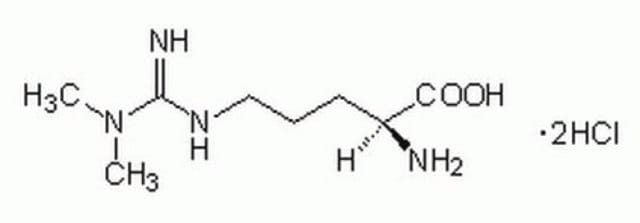M7033
NG-Methyl-L-arginine acetate salt
≥98% (TLC), powder, nitric oxide synthase inhibitor
Synonym(s):
Nω-Methyl-L-arginine acetate salt, L-NMMA, N5-(Methylamidino)-L-ornithine acetate salt, NG-Monomethyl-L-arginine acetate salt
About This Item
Recommended Products
Product Name
NG-Methyl-L-arginine acetate salt, ≥98% (TLC)
Quality Level
Assay
≥98% (TLC)
form
powder
solubility
water: 49.00-51.00 mg/mL, clear to very slightly hazy, colorless to faintly yellow
SMILES string
CC(O)=O.CNC(=N)NCCC[C@H](N)C(O)=O
InChI
1S/C7H16N4O2.C2H4O2/c1-10-7(9)11-4-2-3-5(8)6(12)13;1-2(3)4/h5H,2-4,8H2,1H3,(H,12,13)(H3,9,10,11);1H3,(H,3,4)/t5-;/m0./s1
InChI key
IKPNWIGTWUZCKM-JEDNCBNOSA-N
Gene Information
human ... NOS1(4842) , NOS2(4843) , NOS3(4846)
mouse ... Nos2(18126)
rat ... Nos1(24598) , Nos2(24599)
Looking for similar products? Visit Product Comparison Guide
Application
- as an inhibitor of nitric oxide synthase (NOS) in wound healing studies in injured mice
- as an inhibitor of nitric oxide synthase (NOS) to study nitric oxide (NO) immunosuppressive effect of murine stem cells
- as an inhibitor to monitor NO levels in hemocytes respiratory burst assay
Biochem/physiol Actions
Features and Benefits
Storage Class Code
11 - Combustible Solids
WGK
WGK 3
Flash Point(F)
Not applicable
Flash Point(C)
Not applicable
Personal Protective Equipment
Choose from one of the most recent versions:
Certificates of Analysis (COA)
Don't see the Right Version?
If you require a particular version, you can look up a specific certificate by the Lot or Batch number.
Already Own This Product?
Find documentation for the products that you have recently purchased in the Document Library.
Customers Also Viewed
Articles
DISCOVER Bioactive Small Molecules for Nitric Oxide & Cell Stress Research
DISCOVER Bioactive Small Molecules for Nitric Oxide & Cell Stress Research
DISCOVER Bioactive Small Molecules for Nitric Oxide & Cell Stress Research
DISCOVER Bioactive Small Molecules for Nitric Oxide & Cell Stress Research
Our team of scientists has experience in all areas of research including Life Science, Material Science, Chemical Synthesis, Chromatography, Analytical and many others.
Contact Technical Service









